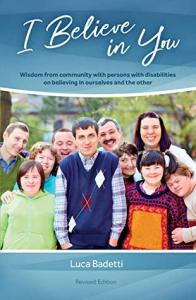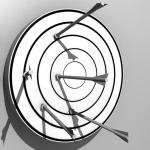Luca Badetti, the director of community life at L’Arche in Chicago, recently wrote a book talking about how disabled and non-disabled people can learn love from each other. New City Press published I Believe in You: Wisdom from community with persons with disabilities on believing in ourselves and the other. I think this book is helpful for those who work in disability ministry but likely also helpful for others.
Most of this book is about relationships, and as such, hard to summarize for a review like this. I will give three points from his overall message then summarize three examples of these relational stories.
Three Points from Badetti’s Message

Badetii gives what might be a thesis statement rather early. He notes, “I believe people with intellectual disabilities do have a special gift that can help transform society so that it becomes more human. I have found inspiration in this, but I have also found inspiration in the people without intellectual disabilities who live community with them.” (16) Society tends to focus on a one-size-fits-all and tends to lose human dignity in our over-focus on what people can do instead of who they are.
Badetti notes an issue that is very present for most autistics who are able to fake being non-autistic for periods (like myself): the issue of masking. But he makes it more general. We all wear masks that likely “consist of inner dynamics and mechanisms that may be the product of years of pressures we have put on ourselves to match our own idealized self-image or to be how others want us to be, insofar as these distanced us from our own reality. Our masks may be the result of habits, patterns, and roles we created for ourselves as our fears and insecurities came up against threats from the external world.” (27) These masks can be an obstacle to prayer as God wants to know how we are without a mask. Often seeing people who don’t use masks (including those with intellectual disabilities) can help us drop our own masks.
Badetti also points out a major error in our culture: “Our society is obsessed with doing. A person is often valued in terms of activity and productivity. This leaves people with disabilities consistently at the tail end of the social scale.” In opposition, he notes, “We are who we are, not what we do or what we produce.” (31) This being over having is a tough but important point for today. In this respect, he recounts how one resident compared L’Arche to her former institution. He notes, “When she was younger, before coming to community, Karen lived in an institution with other people with disabilities… She describes the institution as if it were an enclosed prison, with no possibility of escape. On the outskirts of a small city surrounded by vast cornfields, hidden from the public eye, in an alienating and overcrowded space (hundreds of people lived there), residents were subject to inconsiderate and cruel treatment by staff. Some even died of abuse.” (50)
Lucia Communicates
One of the residents Badetti mentions is Lucia who is unable to speak or as far as I can tell use AAC or similar to communicate in a widely recognized way. She would sit rocking and looking Badetti would sit beside her to be present and she would grab his hand or his scarf. He struggles to understand her and even after years being with her, he notes, “I am still learning the language of Lucia.” (67) some things she wants to communicate but in those little actions he often sees a communication of presence, of relationship that can’t really be put into words.
He reflects on how this physical communication is the exact opposite of what we so commonly have with online communication where it is all words and no physicality. Badetti notes, “In living community with others, our bodily communication has the capacity to express the care with which we treat them as people and what we want to reveal to them.” (70) It is this bodily friendship that can often be missing today.
Nick and The Flintstones
In the epilogue, Badetti speaks of an interaction with Nick who loves The Flintstones. Nick was almost always joyful, despite some difficulties in this life. Nick gets Badetti to read him a book, then they put on an episode of the cartoon. Once it’s going, Badetti moves to pick up a theology book, but Nick brings him back to the presence of the moment enjoying time watching Fred and Wilma. This touched me, maybe as I could totally see myself in Badetti’s shoes here: “OK, you’re occupied with a cartoon so I’m going to pick up my dense theology text.” He notes, that instead of this theology, “He asked that I be present to him, which made sense to me, as that was precious for him-and for me. Watching an animated sitcom alongside him was enough.” (113)
Cautions
I have three cautions about the book nonetheless. First, he uses “with autism” instead of “autistic” and similar when the overwhelming majority of those with such a diagnosis prefer the latter which makes me wonder about his full commitment to accompanying disabled people where they are. Second, a few of the stories border on “inspiration porn.” Inspiration porn is widely hated in the disability community when it infantilizes a disabled person showing “wow! They can also do this thing that almost everyone can,” or when it seems to make the disabled exist simply for none disabled folks to draw inspiration from. I think a few stories tend in that direction, and he could show more stories of the intellectually disabled learning from him rather than focusing just on the other direction to show a mutual relationship, not something one-way. However, he avoids anything too clearly “inspiration porn” and this tendency is not overwhelming. Third, I’m not sure how much can be taken from the fact this is a reprint where the main difference seems to be removing a foreword by Jean Vanier and adding discussion questions. After recent revelations of sexual abuse, it is obvious that Vanier should be removed, but I doubt Badetti knew anything so I can’t judge him for not being omniscient.
Conclusion
Overall, I would recommend Badetti. I think it deserves 4/5 stars. Most of the book is quite good but the first two cautions I noted just above prevent it from reaching 5 stars. We do need to be remembering and being, over doing; and stop to be present to others such as the disabled.
Notes:
- New City Press sent me a free review copy of this book.
- Please support me on Patreon so I can keep writing more analysis of Catholicism and autism.












